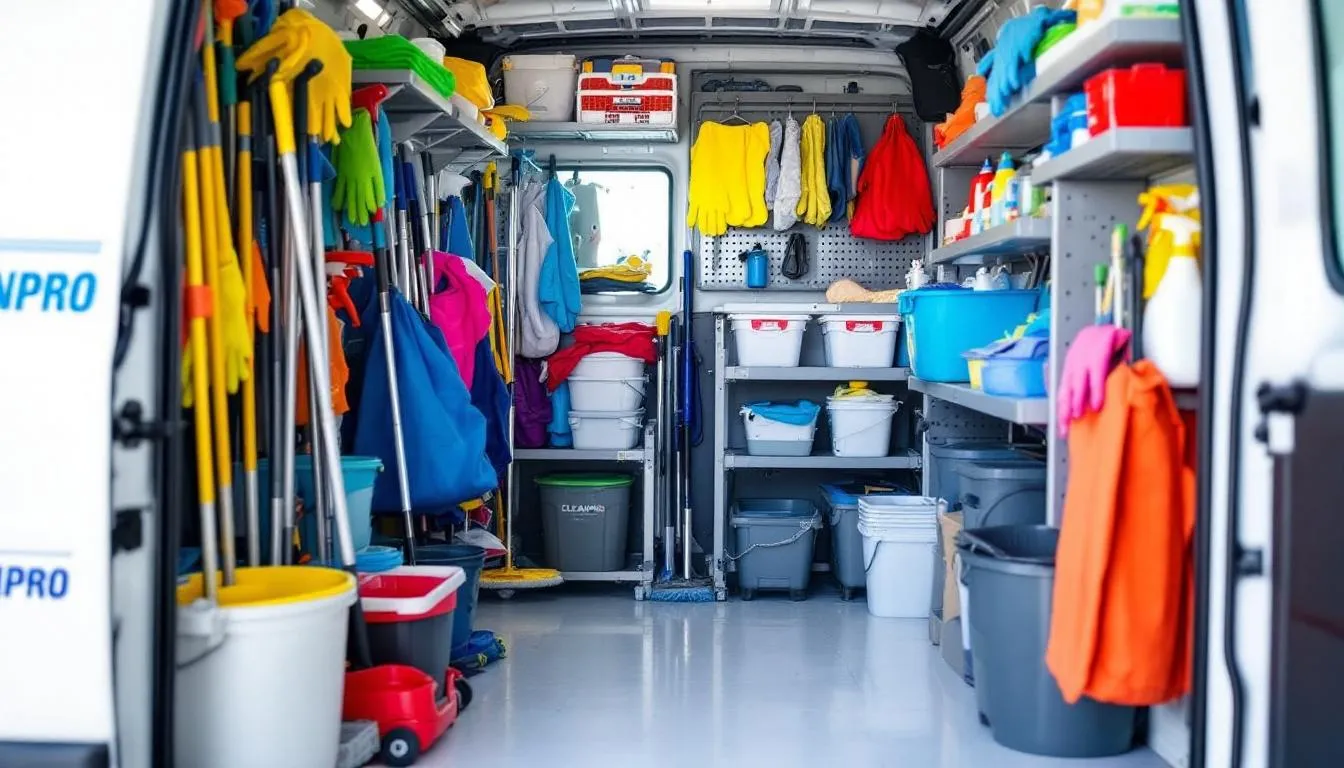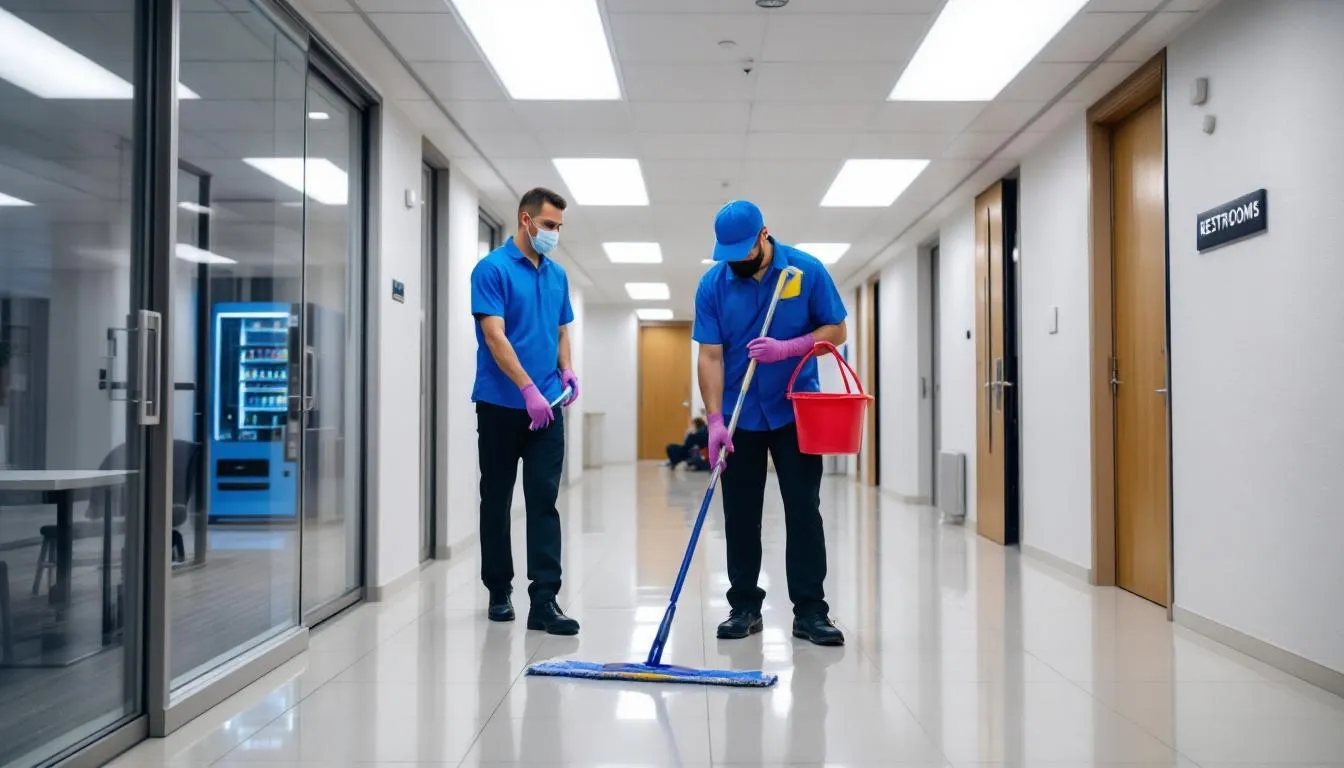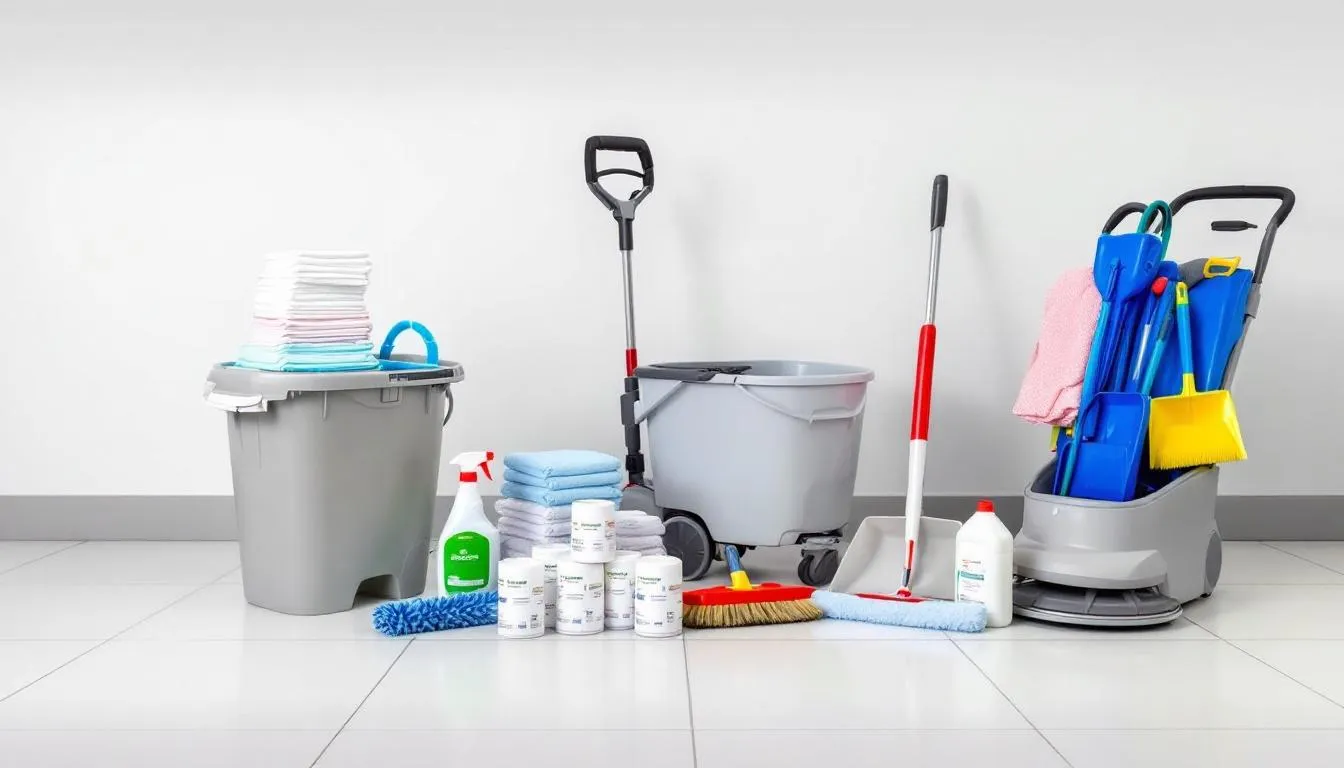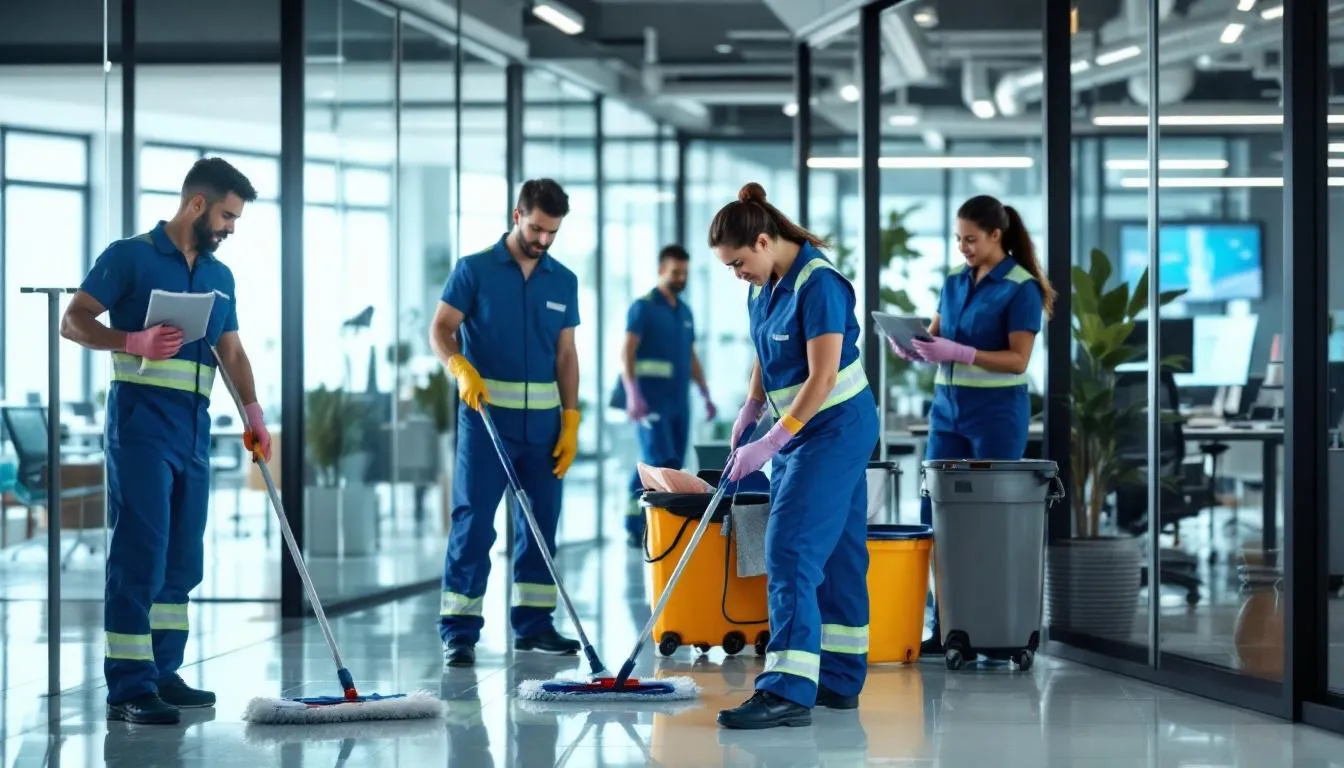Wisconsin’s $1.2 billion cleaning industry presents a remarkable opportunity for entrepreneurs ready to build their own successful business. With consistent demand across residential and commercial markets, starting a cleaning company offers the potential for steady revenue and scalable growth. Whether you’re targeting busy professionals in Milwaukee, growing families in Madison suburbs, or commercial properties in Green Bay, the cleaning industry provides multiple pathways to success.
This comprehensive guide walks you through every step needed to launch your Wisconsin cleaning business. From understanding state-specific regulations to developing competitive pricing strategies, you’ll discover exactly what it takes to operate legally, attract clients, and build a profitable operation. With proper planning and execution, you can expect to serve your first client within 2-6 weeks and invest between $2,000-$10,000 to get started, depending on your business scope.
The key to success lies in understanding Wisconsin’s unique market dynamics, regulatory requirements, and customer preferences. Let’s dive into the step-by-step process that will transform your cleaning business idea into a thriving company.
Quick Start Overview: Essential Steps to Launch Your Wisconsin Cleaning Business
Starting a cleaning business requires careful planning and systematic execution. Here’s your complete checklist for launching successfully in Wisconsin:
Week 1-2: Planning and Research
- Conduct market research in your target Wisconsin cities
- Choose your business structure (LLC recommended)
- Develop your business plan using our free template
- Secure initial funding ($2,000-$10,000 range)
Week 3-4: Legal Foundation
- Register your business with Wisconsin Department of Financial Institutions
- Obtain EIN from IRS for tax purposes
- Apply for necessary licenses and permits
- Secure business insurance and bonding
Week 5-6: Operational Setup
- Purchase essential equipment and cleaning supplies
- Establish pricing strategy based on Wisconsin market rates
- Create marketing materials and online presence
- Launch customer acquisition efforts
Timeline Expectations: Most entrepreneurs can complete the setup process in 2-6 weeks, with simpler residential operations launching faster than complex commercial cleaning services.
Initial Investment Breakdown:
- Business registration and permits: $200-$500
- Insurance and bonding: $600-$1,200 annually
- Equipment and supplies: $1,500-$5,000
- Marketing and branding: $300-$1,000
- Working capital: $500-$2,000
Wisconsin-Specific Opportunities: The state’s harsh winters create consistent demand for indoor cleaning services, while summer months bring lucrative move-out and deep cleaning requests. Medical facilities, educational institutions, and growing tech companies in Madison and Milwaukee present excellent commercial prospects.

Research the Wisconsin Cleaning Market
Understanding your local market forms the foundation of any successful cleaning business. Wisconsin’s cleaning industry generates approximately $1.2 billion annually with steady 6% growth, driven by demographic trends and evolving hygiene expectations post-pandemic.
Wisconsin Market Statistics:
- Market size: $1.2 billion annually
- Annual growth rate: 6%
- Average household income: $64,168 (supporting regular cleaning services)
- Commercial space: Over 450 million square feet statewide
- Aging population: 17% over 65 (increasing demand for cleaning services)
High-Demand Geographic Areas: Milwaukee metropolitan area leads demand with over 1.5 million residents and numerous commercial districts. Madison’s growing tech sector and university presence create consistent commercial and residential opportunities. Green Bay’s industrial base and suburban expansion offer diverse market segments. Smaller cities like Kenosha, Racine, and Eau Claire present less saturated markets with growth potential.
Seasonal Considerations: Wisconsin’s climate creates unique opportunities throughout the year. Winter months drive indoor cleaning demand as people spend more time indoors and track in salt and snow. Spring brings deep cleaning and move-out services as students leave university towns. Summer peak season includes vacation rental cleaning and outdoor event cleanup. Fall focuses on preparing homes and businesses for winter months.
Competitor Analysis Strategy: Use Google Maps to search “cleaning services near [your city]” and document pricing, services offered, and customer reviews. Check Yelp, Angie’s List, and Facebook for additional competitor insights. Visit competitor websites to analyze their positioning and identify gaps in service offerings.
Identifying Underserved Niches:
- Post-construction cleanup for Wisconsin’s growing construction industry
- Medical facilities requiring specialized disinfection protocols
- Eco-friendly cleaning using biodegradable products
- Elder care facilities and senior living communities
- Vacation rental cleaning in Wisconsin Dells and Door County
Target Market Analysis
Wisconsin’s diverse economy creates multiple target segments for cleaning businesses. Understanding each segment’s specific needs and payment capabilities helps focus your marketing efforts and service development.
Residential Market Characteristics:
- Working families with household incomes above $50,000
- Elderly residents needing regular maintenance cleaning
- Busy professionals in Madison and Milwaukee metro areas
- Property management companies overseeing rental units
- Real estate agents requiring move-in/move-out cleaning
Commercial Market Opportunities:
- Office buildings and corporate headquarters
- Retail stores and shopping centers
- Medical facilities and dental offices
- Educational institutions and daycare centers
- Manufacturing facilities requiring specialized cleaning
Pricing Research Results: Wisconsin residential cleaning rates typically range from $25-50 per hour, with flat-rate pricing between $100-250 per home depending on size and service level. Commercial cleaning averages $0.10-0.20 per square foot, with specialized services commanding premium rates. Deep cleaning services can charge 50-100% above standard rates.
Market research reveals that Wisconsin clients value reliability, bonding/insurance coverage, and consistent quality over the lowest price. Eco-friendly services command 10-15% premium rates in urban markets.
Choose Your Business Structure and Register in Wisconsin
Selecting the right business structure protects your personal assets while positioning your cleaning company for growth. Wisconsin offers several options, each with distinct advantages for cleaning businesses.
Business Structure Options:
Sole Proprietorship:
- Pros: Simplest setup, no registration fees, direct tax benefits
- Cons: Personal liability exposure, limited credibility with commercial clients
- Best for: Individual operators serving residential markets
Limited Liability Company (LLC):
- Pros: Personal asset protection, professional credibility, tax flexibility
- Cons: $130 filing fee, annual report requirements
- Best for: Most cleaning businesses planning to hire employees or serve commercial clients
Corporation:
- Pros: Maximum liability protection, easier to raise capital, perpetual existence
- Cons: $100 filing fee plus ongoing compliance costs, double taxation potential
- Best for: Large-scale operations with multiple locations
Wisconsin Department of Financial Institutions Registration: The wisconsin department requires all LLCs and corporations to register before conducting business. The process takes 1-3 business days online and includes:
- Choose and reserve your business name
- File Articles of Organization (LLC) or Incorporation (Corporation)
- Pay required filing fees
- Designate a registered agent in Wisconsin
- Receive confirmation and state-issued documentation
Cost Breakdown:
- LLC filing fee: $130
- Corporation filing fee: $100
- Registered agent service: $50-200 annually (if using third-party)
- Name reservation: $15 (optional but recommended)
EIN Application Process: All businesses except sole proprietorships must obtain an Employer Identification Number from the IRS. Even sole proprietors benefit from an EIN for business bank account opening and professional credibility. Apply online at IRS.gov for immediate approval.

Business Name Registration
Your company name represents your brand and must comply with Wisconsin regulations while remaining available for registration and domain use.
Wisconsin Business Name Requirements:
- Must include “LLC” or “Limited Liability Company” for LLCs
- Cannot imply governmental affiliation
- Must be distinguishable from existing registered businesses
- Cannot contain prohibited words without proper licensing
Name Search Process: Search the Wisconsin Department of Financial Institutions database at www.wdfi.org to verify name availability. Check multiple variations of your preferred name, as similar names may cause rejection.
Trade Name Registration: If operating under a name different from your registered business name, file a “Doing Business As” (DBA) with your county clerk. This costs $5-25 depending on the county and must be renewed every 5 years.
Domain and Social Media Considerations: Before finalizing your business name, verify domain availability for your website and check social media handle availability on Facebook, Instagram, and Google My Business. Consistent branding across all platforms strengthens your professional image.
Trademark Protection: While not required, consider trademark registration if you plan to expand beyond Wisconsin or franchise your business. Search the USPTO database and consult with an attorney for valuable brand names.
Obtain Required Licenses and Permits
Operating a cleaning business legally in Wisconsin requires several licenses and permits. While the state doesn’t mandate specific licenses for general cleaning services, local municipalities and specialized services may have additional requirements.
Wisconsin State Requirements: Wisconsin doesn’t require a specific state license for general cleaning businesses. However, you must register your business with the wisconsin department and obtain proper tax identification. Businesses selling cleaning products directly to consumers need a seller’s permit from the Wisconsin Department of Revenue.
City-Specific License Requirements:
Milwaukee: Requires a general business license costing $65-$110 annually, depending on business type. Home-based businesses need additional permits if operating from residential areas.
Madison: Issues business licenses through the City Clerk’s office for $75 annually. Cleaning businesses operating vehicles require additional commercial vehicle permits.
Green Bay: Requires business registration and may mandate additional permits for businesses using chemicals or operating in specific zones.
County-Level Permits: Most Wisconsin counties require business registration and may have specific zoning requirements. Home-based cleaning businesses must verify residential zoning allows commercial operations. Some counties require separate permits for businesses storing large quantities of cleaning chemicals.
Sales Tax Permit: Register with the Wisconsin Department of Revenue if you sell cleaning products, supplies, or tangible goods to customers. This allows you to collect and remit sales tax. The permit is free, but you’ll need to file regular returns even if no sales occurred.
Workers’ Compensation Requirements: Wisconsin mandates workers’ compensation insurance for businesses with three or more employees. Even with fewer employees, voluntary coverage protects your business and may be required by commercial clients.
Specialized Service Permits: Certain cleaning services require additional certification:
- Pesticide application requires state licensing
- Medical facility cleaning may need specialized training certification
- Hazardous material cleanup requires extensive permitting and insurance

Secure Essential Business Insurance
Business insurance protects your cleaning company from liability claims, property damage, and operational risks. Wisconsin cleaning businesses face unique exposures that proper insurance coverage addresses.
General Liability Insurance: This foundational coverage protects against third-party claims for property damage or bodily injury. For cleaning businesses, this includes damage to client property, slip-and-fall accidents, and product liability claims. Annual premiums typically range from $400-800 for small cleaning operations, increasing with revenue and employee count.
Professional Liability Coverage: Also called errors and omissions insurance, this protects against claims of inadequate service or failure to meet contractual obligations. While not always required, it’s valuable for commercial cleaning contracts where service failures could cost clients significant money.
Bonding Requirements: Many clients, especially commercial customers, require bonded cleaning services. Bonding provides financial protection if your employees steal from client premises. Coverage typically ranges from $5,000-25,000, with annual costs of $100-500 depending on coverage amount and employee count.
Commercial Auto Insurance: If using vehicles for your cleaning business, standard personal auto insurance won’t cover business use. Commercial auto insurance protects vehicles, equipment, and provides liability coverage during business operations. Annual costs range from $800-2,500 depending on vehicle type and coverage limits.
Workers’ Compensation Insurance: Wisconsin requires workers’ compensation for businesses with three or more employees. Rates for cleaning businesses typically range from $2-5 per $100 of payroll, varying by specific job classifications and claims history.
Equipment Coverage: Protect your investment in vacuum cleaners, commercial equipment, and supplies with equipment coverage. This can be added to general liability policies or purchased separately. Consider coverage for equipment stored in vehicles overnight.
Wisconsin Insurance Considerations: Wisconsin’s harsh winters increase slip-and-fall risks, making adequate liability coverage crucial. The state’s strong labor protections also emphasize the importance of proper workers’ compensation coverage.
Purchase Equipment and Supplies
Investing in quality equipment and supplies sets the foundation for delivering professional results and building client trust. Your equipment needs vary significantly based on whether you focus on residential or commercial markets.
Essential Equipment Checklist:
Cleaning Equipment:
- Commercial-grade vacuum cleaners: $300-800 each
- Microfiber cloths and mops: $100-200 initial supply
- Buckets, spray bottles, and caddies: $50-100
- Extension cords and power strips: $50-75
- Ladder for high surfaces: $100-200
Professional Supplies:
- All-purpose cleaners and disinfectants: $100-200 monthly
- Glass cleaners and specialized products: $50-100 monthly
- Trash bags and paper towels: $75-150 monthly
- Personal protective equipment: $50-100 monthly
Transportation and Storage:
- Reliable vehicle or trailer for equipment transport
- Lockable storage containers for security
- Equipment organization systems for efficiency
Budget Breakdown by Business Type:
Residential Cleaning Startup: $1,500-3,000
- Basic vacuum and supplies: $500-800
- Initial product inventory: $200-400
- Vehicle organization: $300-500
- Marketing materials: $200-400
- Working capital: $300-900
Commercial Cleaning Startup: $3,000-7,000. Learn more about how to scale your cleaning startup into a million dollar cleaning business.
- Industrial equipment: $1,500-3,000
- Larger supply inventory: $500-1,000
- Specialized products: $300-600
- Professional uniforms: $200-400
- Technology systems: $500-1,000
Wisconsin Supplier Recommendations: Several local suppliers offer competitive pricing and delivery throughout Wisconsin. Establish relationships with multiple suppliers to ensure consistent availability and competitive pricing. Consider joining group purchasing organizations to access volume discounts.
Eco-Friendly Products: Wisconsin clients increasingly request environmentally responsible cleaning products. Green cleaning supplies typically cost 10-20% more but allow premium pricing and appeal to environmentally conscious customers.
Technology Integration: Modern cleaning businesses benefit from scheduling software, time tracking apps, and digital payment processing. Popular options include Aspire, ServiceTitan, and QuickBooks for comprehensive business management.

Develop Pricing Strategy
Competitive pricing balances profitability with market positioning. Wisconsin’s cleaning market supports various pricing models, allowing flexibility based on your target customers and service offerings.
Wisconsin Market Pricing Analysis:
Residential Cleaning Rates:
- Hourly pricing: $25-45 per hour per cleaner
- Flat rate pricing: $100-200 per home (varies by size)
- Per-room pricing: $25-50 per room
- Square footage pricing: $0.08-0.15 per square foot
- Small offices: $0.10-0.15 per square foot
- Large commercial spaces: $0.08-0.12 per square foot
- Medical facilities: $0.15-0.25 per square foot (specialized cleaning)
- Post-construction: $0.20-0.40 per square foot
Specialty Service Pricing:
- Deep cleaning: 150-200% of standard rate
- Move-out cleaning: $200-400 per unit
- Post-construction cleanup: $0.25-0.50 per square foot
- Carpet cleaning add-on: $25-50 per room
- Window cleaning: $3-8 per window
Pricing Model Selection:
Hourly Pricing Benefits:
- Transparent for customers
- Accommodates varying job complexity
- Easy to adjust for additional services
- Works well for residential markets
Flat Rate Pricing Benefits:
- Predictable revenue for business planning
- Easier customer budgeting
- Encourages efficiency improvements
- Preferred by many commercial clients
Factors Affecting Pricing:
- Geographic location within Wisconsin
- Competition density in your market
- Service quality and reliability reputation
- Insurance and bonding coverage
- Specialized certifications or training
- Equipment quality and capabilities
Seasonal Pricing Adjustments: Wisconsin’s seasonal demands allow strategic pricing adjustments. Consider premium rates during peak moving season (summer) and holiday preparation periods (November-December). Winter rates may need adjustment for increased heating costs and challenging weather conditions.
Package Deal Development: Create service packages that provide value while increasing average transaction size. Popular combinations include regular cleaning plus monthly deep cleaning, or basic service with quarterly carpet cleaning.
Create Your Marketing Plan
Effective marketing drives consistent client acquisition and builds long-term business success. Wisconsin cleaning businesses benefit from combining digital strategies with traditional local marketing approaches.
Digital Marketing Strategy:
Google My Business Optimization: Claim and optimize your Google My Business listing for each Wisconsin city you serve. Include accurate business information, service areas, hours, and regularly post updates. Encourage satisfied customers to leave reviews, as local search rankings heavily weight review quantity and quality.
Local SEO Implementation: Optimize your website for location-based searches like “cleaning service Milwaukee” or “house cleaners Madison.” Create separate landing pages for each city you serve, including relevant local content and contact information.
Social Media Presence: Facebook and Instagram work well for cleaning businesses. Share before/after photos, customer testimonials, and cleaning tips. Join local community groups where potential customers discuss service recommendations.
Online Advertising: Google Ads and Facebook advertising can generate immediate leads. Target specific Wisconsin zip codes and demographics matching your ideal customer profile. Start with small budgets ($300-500 monthly) and scale based on results.
Traditional Marketing Approaches:
Door Hanger Campaigns: Well-designed door hangers remain effective for residential cleaning services. Target neighborhoods matching your ideal customer demographics. Include special offers for first-time customers and clear contact information.
Local Newspaper Advertising: Many Wisconsin communities still read local newspapers, especially older demographics who frequently use cleaning services. Consider small display ads or classified sections for cost-effective exposure.
Community Board Postings: Post flyers at grocery stores, community centers, libraries, and coffee shops. Many Wisconsin communities maintain physical bulletin boards where residents look for local services.
Referral Program Development: Satisfied customers provide the best marketing. Develop a formal referral program offering discounts or credits for successful referrals. Consider tiered rewards for customers who generate multiple referrals.
Partnership Opportunities: Build relationships with complementary businesses that serve similar customers:
- Real estate agents needing move-in/move-out cleaning
- Property management companies with multiple units
- Interior designers requiring post-project cleanup
- Senior care facilities needing additional services
Build Your Online Presence
Your online presence often provides the first impression for potential customers. A professional website and active social media engagement build credibility and generate leads.
Professional Website Requirements:
- Clear service descriptions and pricing information
- Before/after photo galleries showcasing your work
- Customer testimonials and reviews
- Easy contact forms and online booking capability
- Mobile-responsive design for smartphone users
- Local SEO optimization for Wisconsin searches
Online Booking System Integration: Allow customers to schedule services online 24/7. Popular scheduling platforms include Acuity Scheduling, Calendly, and industry-specific solutions like ZenMaid. Online booking reduces phone calls and improves customer convenience.
Customer Review Management: Monitor and respond to reviews on Google, Yelp, Facebook, and Angie’s List. Respond professionally to both positive and negative reviews. Use review management tools to track your online reputation across multiple platforms.
Content Marketing Strategy: Create valuable content that helps potential customers while showcasing your expertise:
- Seasonal cleaning checklists for Wisconsin homes
- Tips for maintaining clean offices during flu season
- Guide to eco-friendly cleaning products
- Before/after case studies of challenging projects
Social Media Content Calendar: Plan regular posts showcasing your work, sharing cleaning tips, and engaging with the Wisconsin community. Post consistently but focus on quality over quantity. Use local hashtags to increase visibility within your service areas.

Hire and Train Your Team
Building a reliable team enables business growth beyond personal capacity. Wisconsin’s employment laws and competitive labor market require careful attention to hiring and retention strategies.
Wisconsin Employment Law Requirements:
Hiring Compliance: Wisconsin prohibits discrimination based on protected characteristics including age, race, gender, and disability status. Use consistent hiring practices and document your decision-making process. Verify employment eligibility using I-9 forms for all employees.
Background Check Considerations: While not legally required, background checks make sense for cleaning businesses entering client homes and businesses. Use compliant screening services and follow Fair Credit Reporting Act guidelines. Consider criminal history carefully and focus on job-relevant convictions.
Wage and Hour Compliance: Wisconsin’s minimum wage is $7.25 per hour, though many cleaning businesses pay above minimum wage to attract quality workers. Pay overtime (1.5x regular rate) for hours over 40 per week. Maintain accurate time records for all employees.
Effective Hiring Process:
Job Description Development: Create clear job descriptions outlining physical requirements, work schedules, and performance expectations. Highlight advancement opportunities and benefits to attract quality candidates.
Interview Strategy: Use behavioral interview questions to assess reliability, attention to detail, and customer service skills. Ask about previous cleaning experience but consider training motivated candidates without direct experience.
Reference Verification: Contact previous employers to verify work history and performance. Pay particular attention to reliability, trustworthiness, and ability to work independently.
Training Program Development:
Technical Skills Training:
- Proper use of cleaning equipment and products
- Efficient cleaning techniques for different surfaces
- Safety procedures and chemical handling
- Quality control standards and inspection procedures
Customer Service Training:
- Professional appearance and communication
- Handling customer complaints and requests
- Protecting customer property and privacy
- Emergency procedures and problem escalation
Employee Handbook Creation: Develop comprehensive policies covering:
- Work schedules and time-off procedures
- Dress code and professional standards
- Safety requirements and accident reporting
- Performance expectations and review processes
- Disciplinary procedures and termination policies
Payroll and Tax Setup: Register with Wisconsin Department of Workforce Development for unemployment insurance. Obtain workers’ compensation insurance as required by law. Use payroll software or services to ensure proper tax withholding and reporting.
Retention Strategies: Cleaning industry turnover rates often exceed 100% annually. Combat this with competitive wages, performance bonuses, advancement opportunities, and positive work environment. Regular feedback and recognition programs improve employee satisfaction.
Launch Your Business Operations
Successful launch requires careful coordination of all business elements while focusing on delivering exceptional service to early customers.
First Client Acquisition Strategies:
Launch Pricing Strategy: Consider introductory pricing for first-time customers to generate initial bookings and reviews. Offer 20-30% discounts for first cleaning or package deals for commitment to regular service. Ensure pricing still covers costs and provides reasonable profit margin.
Initial Service Delivery: Exceed expectations with your first clients as they become your references and review sources. Arrive early, work efficiently, and address any concerns immediately. Follow up within 24 hours to ensure satisfaction.
Quality Control Implementation: Develop inspection checklists ensuring consistent service quality. Consider having team leaders inspect work initially. Take before/after photos for quality documentation and marketing use.
Customer Feedback Collection: Systematically collect feedback from early customers to identify improvement opportunities. Use online surveys, phone calls, or in-person discussions to gather insights.
Scheduling and Route Optimization:
Geographic Efficiency: Plan routes to minimize travel time and fuel costs. Group customers by geographic area and schedule efficiently. Use mapping software to optimize daily routes as customer base grows.
Scheduling Software Implementation: Use professional scheduling software to manage appointments, track employee time, and communicate with customers. Popular options include Aspire, ServiceTitan, and industry-specific solutions.
Emergency Response Procedures: Develop procedures for handling scheduling conflicts, employee absences, and customer emergencies. Have backup plans to maintain service reliability.
Financial Management Setup:
Invoice and Payment Processing: Implement efficient billing systems that accommodate customer preferences. Offer multiple payment options including online payments, automatic billing, and traditional methods.
Cash Flow Management: Monitor cash flow carefully as cleaning businesses often have irregular payment cycles. Maintain working capital reserves for payroll and supply purchases during slow periods.
Expense Tracking: Track all business expenses for tax purposes and profitability analysis. Use accounting software to categorize expenses and generate financial reports.
Customer Retention Focus: Acquiring new customers costs significantly more than retaining existing ones. Develop systematic follow-up procedures, loyalty programs, and service enhancement strategies to maintain long-term relationships.
Scale and Grow Your Wisconsin Cleaning Business
Growth requires strategic planning, operational efficiency, and market expansion while maintaining service quality that built your initial success.
Service Line Expansion Opportunities:
Complementary Services: Add services that leverage existing customer relationships and equipment:
- Carpet cleaning using professional equipment
- Window washing for residential and commercial clients
- Pressure washing for exterior surfaces and walkways
- Floor stripping and waxing for commercial accounts
- Organizing services for residential customers
Specialized Market Entry: Target higher-margin specialized markets:
- Medical facilities requiring advanced disinfection protocols
- Educational institutions with specific cleaning requirements
- Industrial facilities needing specialized equipment and training
- Vacation rental properties in Wisconsin tourist areas
- Senior living facilities with growing demand
Geographic Expansion Strategy:
Wisconsin Market Expansion: Systematically expand to adjacent markets with similar demographics. Research competition levels, pricing, and regulatory requirements in new territories. Consider the distance impact on operational efficiency and customer service quality.
Market Entry Methods:
- Emerging business models in cleaning services
- Organic growth through marketing in new areas
- Acquisition of existing cleaning businesses
- Partnership with established local service providers
- Franchise opportunities in proven markets
Commercial Contract Development:
Bidding Process Mastery: Learn to respond effectively to commercial cleaning RFPs (Request for Proposals). Develop templates and processes for consistent, competitive bidding. Focus on value proposition rather than lowest price.
Contract Management: Implement systems for managing multiple commercial contracts with varying requirements, schedules, and billing cycles. Ensure consistent service delivery across all accounts.
Technology Upgrades for Efficiency:
Business Management Software: Invest in comprehensive business management platforms that integrate scheduling, billing, customer communication, and employee management. Advanced systems provide analytics for business optimization.
Equipment Technology: Stay current with cleaning equipment innovations that improve efficiency and results. Consider robotic equipment for large commercial accounts and IoT-enabled devices for monitoring and optimization.
Mobile Technology: Equip teams with smartphones or tablets for real-time communication, job updates, and quality documentation. Mobile apps can streamline many operational processes.
Exit Strategy Planning:
Business Valuation Factors: Cleaning businesses typically sell for 2-4 times annual revenue, depending on contract quality, operational systems, and growth potential. Focus on building valuable assets including long-term contracts, trained teams, and systematized operations.
Succession Planning: Consider whether you want to eventually sell to competitors, employees, or franchise your successful model. Early planning affects business development decisions and maximizes eventual value.
Franchising Opportunities: Successful cleaning businesses can become franchisors, licensing their systems and brand to other entrepreneurs. This requires significant legal and operational development but can provide ongoing revenue streams.
Building a successful cleaning business in Wisconsin requires dedication, systematic planning, and consistent execution. The opportunities are substantial for entrepreneurs willing to focus on quality service, legal compliance, and strategic growth. Wisconsin’s diverse economy, growing population, and emphasis on cleanliness create an environment where well-managed cleaning businesses can thrive.
Your success depends on understanding local market dynamics, building strong operational systems, and maintaining excellent customer relationships. Start with thorough planning, focus on delivering exceptional service, and scale systematically as you build experience and resources.
The cleaning industry rewards reliability, professionalism, and attention to detail. By following this comprehensive guide and adapting strategies to your specific market conditions, you can build a profitable cleaning business that serves Wisconsin communities while providing financial independence and growth opportunities.
Take action today by conducting market research in your target area and beginning the business registration process. Your successful Wisconsin cleaning business starts with the first step, and this guide provides the roadmap for every step that follows.